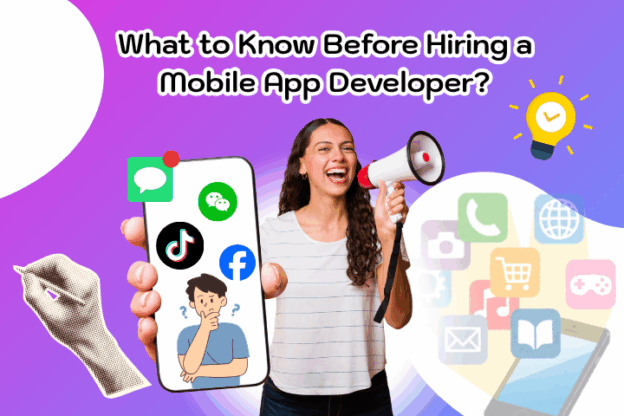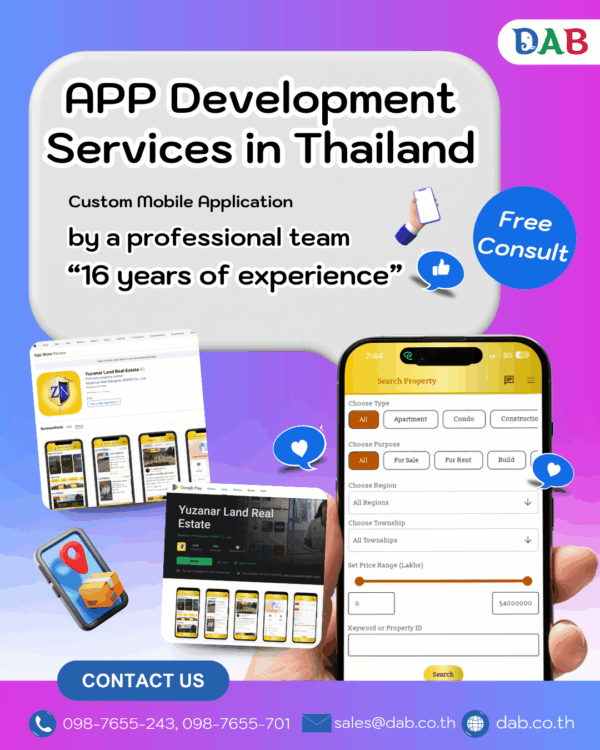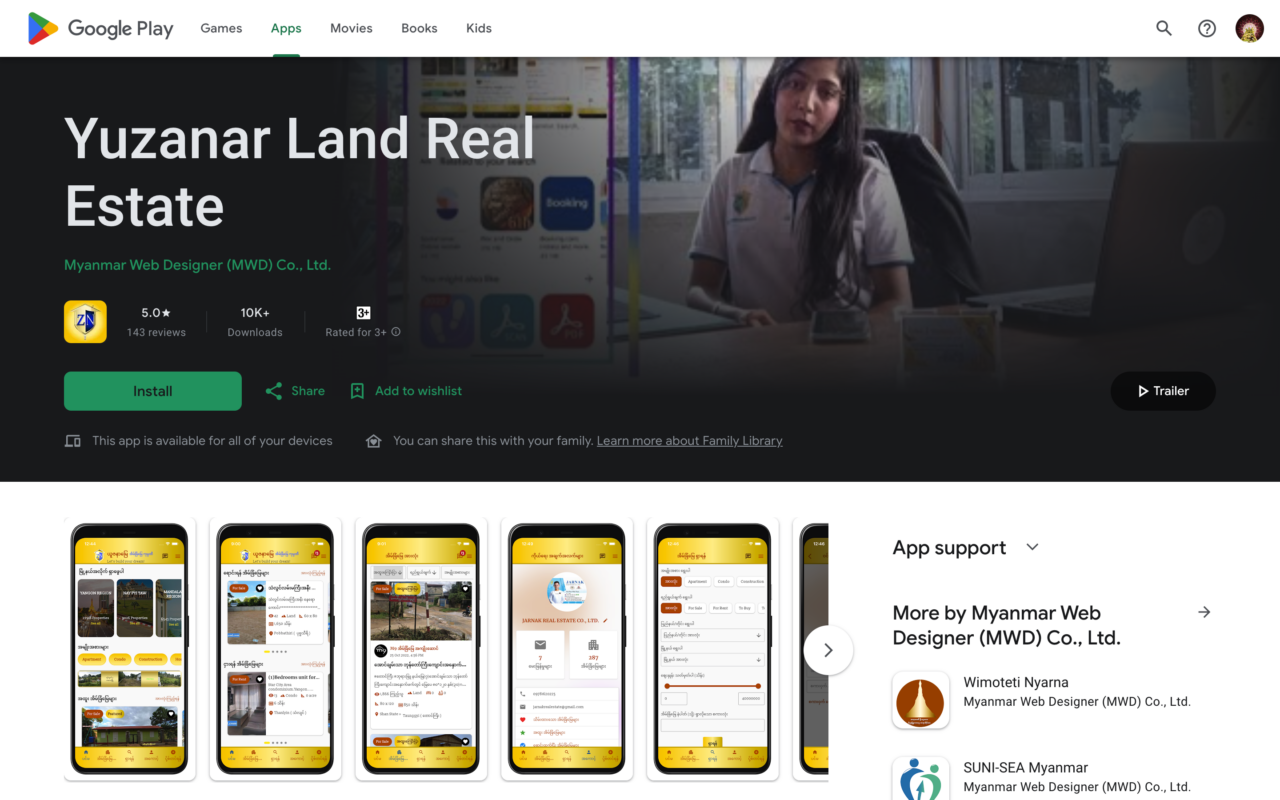What to Know Before Hiring a Mobile App Developer in 2025

- Why More Businesses Are Building Mobile Apps in 2025
- 3 Key Things to Know Before Hiring a Mobile App Developer
- Freelance vs Mobile App Company: Which is Better?
- Conclusion
- FAQ: Frequently Asked Questions About Hiring Mobile App Developers
- Digital Agency Bangkok: Custom Mobile App Development Agency in Thailand
You might have had a great app idea for a long time, but when it comes to actually building it, you may feel unsure where to start. How do you find a trustworthy team to hire for mobile app development? How much should you budget? These questions are common for business owners or startups planning to create their own app. Hiring a development team or a mobile app company isn’t just about price. There are many details to understand beforehand, such as the development process, essential features, and post-launch maintenance all of which affect your app’s long-term success.
This article will help you get a clear overview before hiring a mobile app developer, from setting goals and choosing the right team to knowing what questions to ask before starting a project, ensuring your mobile app investment delivers real business value.
Why More Businesses Are Building Mobile Apps in 2025
Apps provide a more engaging and efficient experience compared to traditional communication methods. They eliminate friction that might slow down customers, such as repeated data entry or complicated payment processes, enabling faster and smoother interactions. This is why mobile app development has become a serious consideration for businesses.
Mobile apps also serve as a direct channel fully controlled by the business. You can send push notifications, create loyalty programs, or personalize the home screen with tailored offers boosting repeat purchases and customer lifetime value more effectively than a website alone. Personalizing experiences is a key reason many brands invest in app development.
From an internal management perspective, many companies develop apps to streamline internal processes, such as inventory management, employee task tracking, or ERP-integrated reporting systems. These improvements reduce operational time and errors, allowing app investments to generate faster ROI when operational savings are considered.
In summary, developing a mobile app is about enhancing user experience, technical capability, long-term revenue, and operational efficiency. If your business aims for any of these, working with an experienced mobile app development company ensures your investment delivers clear, measurable results.
3 Key Things to Know Before Hiring a Mobile App Developer
1. Goals & Scope
Before talking to a developer, clarify what the app is for, who will use it, and what success looks like.
- Define business goals — for example, increase online sales, reduce internal workload, boost customer engagement, or collect user behavior data.
- Identify user personas — general customers, internal employees, or business partners. Each group has different needs, which influence the features you develop.
- Separate core vs. nice-to-have features — without this, costs and timelines can increase. Consider an MVP (Minimum Viable Product) to test the market before expanding.
- Choose platform(s) — Android, iOS, or both. If both, decide between Native vs Cross-platform from the start.
- Set KPIs — such as downloads, daily usage, or repeat purchase rates to measure post-launch success.
Questions to ask yourself/team before talking to a provider:
- What problem does our app solve for users?
- Which features must be in the first version (MVP)?
- Who are the main users, and how will success be measured?
- Does the app need to integrate with other systems (e.g., accounting, ERP, website)?
2. Budget, Timeline & Contract
Unclear budgets and contracts often stall projects. Discuss upfront what the price includes and who owns the work.
- Budget range — App development varies from simple apps to complex systems with APIs and back-end integrations. Setting a rough budget helps filter suitable providers.
- What should be included — UX/UI design, front-end/back-end development, database, payment integration, QA testing, hosting, App Store/Play Store fees, and post-launch maintenance.
- Payment model — Fixed-price vs Time & Materials. Clearly define milestones (e.g., payment on wireframe delivery, test version, or app store submission).
- Contract & ownership (IP) — Specify who owns the code and rights after payment. Include backup, maintenance, and bug warranty policies.
- Service Level Agreement (SLA) & post-launch support — Response times, free bug fixes after delivery, and additional work costs.
- Timeline risk — Include buffers and define conditions for change requests.
Questions to ask providers when requesting a quote:
- What does the price include, and are there extra costs (e.g., store submission or hosting)?
- What is the payment plan (milestones)?
- What warranty/maintenance policies are offered post-delivery?
- Who owns the source code and usage rights after payment?
3. Team, Technology & Development Process
The team and process determine app quality. Don’t choose solely based on price—consider skills and professionalism.
- Portfolio & reviews — Check previous work, especially similar projects. Confirm real downloads and reviews, and clarify the team’s role in each project.
- Native vs Cross-platform — Native (Swift/Kotlin) offers maximum performance but can be expensive. Cross-platform (Flutter, React Native) is faster and cost-effective but has some limitations. Ask why a technology is chosen and its impact on future features.
- Development process — Agile/Sprint/CI-CD, beta releases, and QA testing. Check if testing is done on real devices and if automated testing is used.
- App store submission & post-launch maintenance — Who handles submission, description, updates, and bug fixes?
- Security & data privacy — For apps handling user data, ask about encryption, security measures, and data policies (GDPR/PDPA compliance).
- Access to code & documentation — Request architecture diagrams, repository access (e.g., Git), and user/setup documentation after project completion.
Questions to evaluate a team:
- What technology do you use (Native / Flutter / React Native) and why?
- How do you handle QA and quality assurance?
- Can the team scale to add features in the future?
Freelance vs Mobile App Company: Which is Better?
| Aspect | Freelancer | App Development Company |
| Workflow | Solo or small team, flexible | Dedicated full team: designers, developers, project managers |
| Time management | Adjusts to freelancer schedule | Clear timeline, planned milestones, trackable progress |
| Quality & standards | Depends on individual experience | Multi-step review (UX/UI, QA, device testing), enterprise-level standards |
| Communication | Direct with developer, may be limited | Project manager ensures clear translation of business needs |
| Post-delivery support | Varies, sometimes none | Maintenance, updates, bug fixes, ongoing support |
| Technology & tools | Uses preferred tools | Supports multiple platforms and API/Cloud integration |
| Continuity | Risk if freelancer leaves | Backup team and documentation ensure continuity |
| Contract & reliability | Informal | Formal proposals, contracts, and guarantees, suitable for businesses |
| Brand image | Small or personal projects | Professional design standards, enhances credibility |
| Overall cost | Lower initial cost | Higher budget, but long-term ROI with full-service team |
If you want a long-term, scalable app, a full-service mobile app company is usually the better choice. They reduce risks around timelines, quality, and post-launch support.
Conclusion
Building a mobile app isn’t just about having an idea. It starts with a clear understanding of business goals, core features, budget, and the right development team. Preparing before hiring a developer or company ensures smoother project execution and reduces risks in time and quality.
Choosing a provider with a full team UX/UI designers, developers, QA, and project managers guarantees a professional app ready for real-world use. Understanding Native vs Cross-platform, maintenance, post-launch support, and app ownership rights will help you make confident decisions.
Investing in an experienced mobile app company is not just hiring. It’s creating a business tool that drives revenue, builds customer relationships, and grows your business over time.
FAQ: Frequently Asked Questions About Hiring Mobile App Developers
- How long does it take to develop a mobile app?
It depends on the complexity and number of platforms. A simple app may take 1–2 months, while complex apps with multiple databases can take 4–6 months. Hiring a full-service company ensures clear timeline planning. - Do I need a website before making an app?
Having a website helps developers understand your business and data structure. If you have a backend system, app development is faster. Without a website, the development team can still design database structures and features. - How much does a mobile app cost?
Costs vary based on features and complexity. A basic app may start in the low thousands, while apps with payment systems, memberships, or complex backends may cost more. Discussing with a development company provides an accurate budget estimate. - What happens after the app is finished?
Post-launch, maintenance services handle bug fixes, OS updates, and continuous app performance. Full-service support ensures business continuity. - How do I know if I’m hiring the right developer or company?
Check portfolios, experience in similar apps, workflows, and post-delivery support. A team with project managers, designers, developers, and QA ensures the project follows the plan and maintains quality.
Digital Agency Bangkok: Custom Mobile App Development Agency in Thailand
Digital Agency Bangkok specializes in custom mobile app development for businesses of all sizes in Thailand. The team includes developers, UX/UI designers, QA testers, and project managers experienced in both iOS and Android apps, from small business solutions to complex enterprise systems.
What sets Digital Agency Bangkok apart is the focus on understanding customer needs and real users. Before development, the team plans app structure, core features, and user experience to ensure high-quality, user-friendly, and scalable apps.
For businesses seeking custom mobile apps that meet user and business goals, Digital Agency Bangkok offers a full-service solution: planning, design, development, testing, and post-launch support, making app creation easy and cost-effective.
Phone: 098-7655-243 or 098-7655-701
Email: [email protected]




